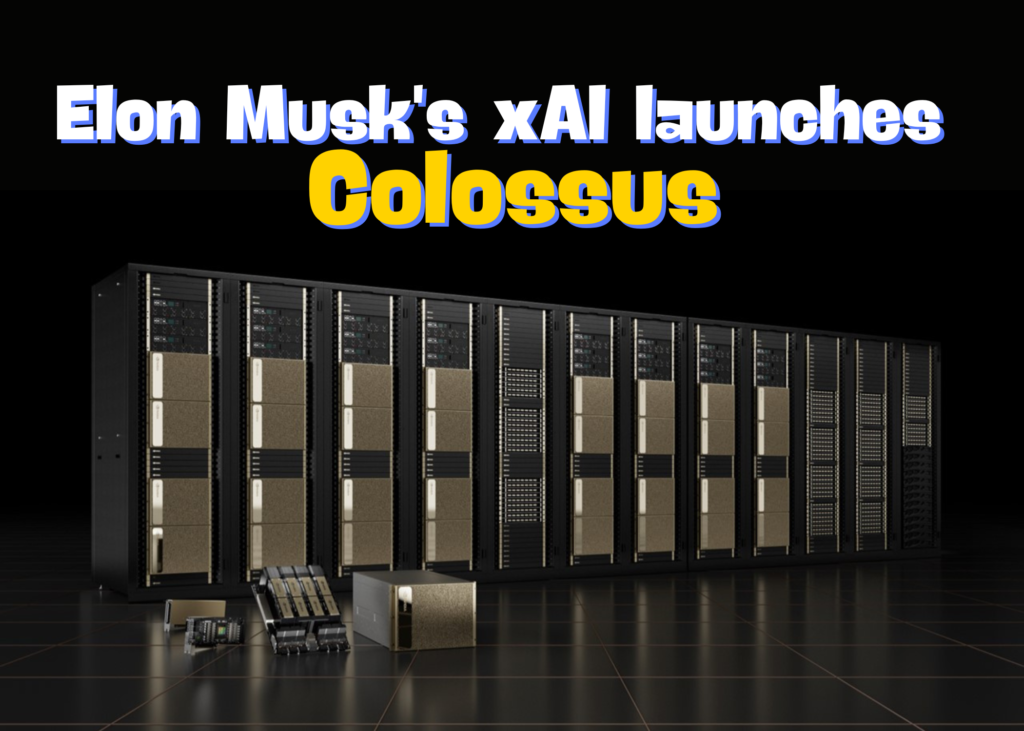In a move that’s sending ripples through the tech world, Elon Musk’s xAI has just pulled back the curtain on Colossus, an AI behemoth powered by a staggering 100,000 Nvidia GPUs. This groundbreaking development signals xAI’s ambition to push the boundaries of artificial intelligence, potentially accelerating the development of AI models that could reshape industries and redefine what’s possible.
xAI’s Ambitious AI Vision
xAI, founded by Elon Musk earlier this year, has been shrouded in mystery since its inception. Musk, known for his ventures like Tesla and SpaceX, has long been vocal about his concerns and aspirations regarding AI. With xAI, he aims to build “good AGI” – artificial general intelligence that benefits humanity. The launch of Colossus is a tangible step towards that vision, showcasing the company’s commitment to developing cutting-edge AI capabilities.
Unveiling the Colossus
Colossus, described as one of the world’s most powerful AI training clusters, boasts an impressive arsenal of 100,000 Nvidia H100 GPUs. The sheer scale of this infrastructure is awe-inspiring. To put it in perspective, many leading AI research labs operate with systems containing only a fraction of this computational power. The speed at which Colossus was brought online is equally remarkable. Built in a mere 122 days, it speaks volumes about xAI’s drive and efficiency.
But the story doesn’t end there. xAI has already set its sights on further expansion, planning to double Colossus’s capacity with an additional 50,000 Nvidia H100 and H200 GPUs. The implications of this upgrade are profound. It could enable xAI to train even larger and more complex AI models, potentially leading to breakthroughs in natural language processing, computer vision, and other AI domains. Imagine AI systems that can understand and generate human-like language with unprecedented accuracy, or robots that can navigate and interact with the physical world seamlessly.
The AI Landscape Transformed
The launch of Colossus is set to intensify the already fierce competition in the AI landscape. Tech giants like Google, Microsoft, and OpenAI are all racing to develop increasingly powerful AI systems. With Colossus, xAI has thrown down the gauntlet, signaling its intent to be a major player in this high-stakes game.
Dr. Emily Chen, an AI researcher at Stanford University, commented, “Colossus is a game-changer. Its sheer scale and computational power have the potential to revolutionize AI research and development. We could see significant advancements in areas like natural language understanding, drug discovery, and climate modeling.”
However, the rise of such powerful AI systems also raises concerns. There’s the potential for misuse, the risk of job displacement, and the broader societal implications of increasingly intelligent machines. As Dr. David Lin, an ethicist at the MIT Media Lab, cautions, “We need to ensure that the development of AI is guided by ethical principles and that its benefits are shared equitably. Colossus represents a tremendous opportunity, but we must proceed with caution and foresight.”
The Future of AI: A Human-Centric Approach
Elon Musk has often spoken about the need for AI to be aligned with human values. With xAI and Colossus, he seems to be putting those words into action. The company’s focus on “good AGI” suggests a human-centric approach to AI development. However, the path forward is not without its challenges. Balancing the pursuit of technological advancement with ethical considerations will be crucial.
As we stand on the cusp of a new era in AI, Colossus serves as a powerful reminder of the immense potential of this technology. It has the power to transform industries, solve complex problems, and augment human capabilities. But it also raises important questions about the future of work, the role of AI in society, and the very nature of intelligence.
The journey has just begun. As xAI continues to push the boundaries of AI with Colossus, the world watches with a mix of anticipation and apprehension. One thing is certain: the future of AI is being shaped right before our eyes, and it’s a future filled with both promise and uncertainty. The question remains: will we harness the power of AI for the betterment of humanity, or will we succumb to its potential pitfalls? Only time will tell.


